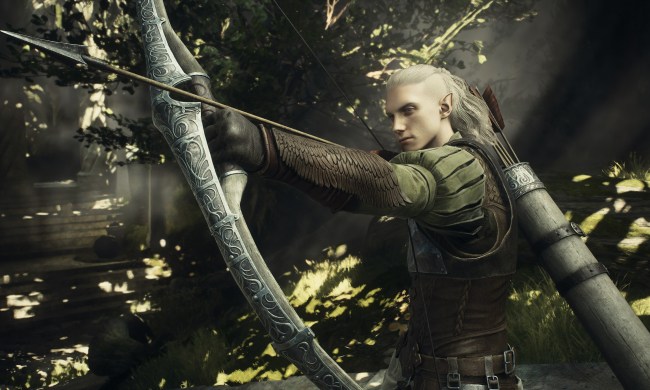
But the PC port hasn’t been as fortunate. Out-sourced to Iron Galaxy Studios, it entered a rough patch last week leading to its removal from digital retailers, including Steam. Iron Galaxy, if you’re not familiar with its work, is more of a technical consulting firm than a game developer, known primarily for porting games like Borderlands 2 to the Vita and Telltale Games’ Back to the Future: The Game to the Wii.
The PC edition of Batman: Arkham Knight is in quite the conundrum. Shortly after its launch, Rocksteady Studios posted an updated list of recommended settings to get the game to run more fluidly. Not only did it demand a more powerful rig to pull off, but it doesn’t take a genius to see that Batman: Arkham Knight would look like a muddled Xbox 360 game had gamers simply ascribed to Rocksteady’s advice, setting all of the bells and whistles either to “Low” or “Off” in order to save face for the release of an undeniably inferior PC port.
Some devs just want to watch the world burn
This isn’t the first PC port to take the back seat to a superior console game. In fact, contrary to popular belief, PC sometimes doesn’t provide the best possible experience for multi-platform games.

The first example that comes to mind is Grand Theft Auto IV, which not only took eight months to make its way to PC after releasing on consoles in April 2008, but also hit single-digit frame rates on even the most capable gaming rigs, according to The Escapist. It was a poorly optimized mess, and without the proper mods installed, some claim that it still is.
Rockstar learned from that experience and, following the release of Grand Theft Auto V in September 2013, though gamers waited nearly two years for a PC version to arrive. With its predecessor still fresh in the minds of experienced gamers, the wait was nothing worth complaining about.
Watch Dogs was another game to suffer from the same technical stuttering and graphical deficiencies we’re seeing from Batman right now. And, like Rocksteady, Ubisoft made a similar suggestion about turning down the graphical fidelity to rectify performance issues. Doing so made the game appear years older than it really was.
Took quite a fall, didn’t we, Master Bruce?
If PC gaming is more popular than ever, shouldn’t we see improvement, not setbacks?
If PC gaming is more popular than ever, why are we seeing setbacks instead of improvements? While the answer isn’t black and white, it’s clear that many of the most-played PC games of this year mostly originated on PC, either as a result of platform exclusivity, or an underlying focus on the advantageous aspects of playing on a hardy rig.
For instance, League of Legends, the title with the most play-time in the month of April, places a heavy emphasis on the kind of player communication and precision that’s only possible with a keyboard and mouse. The same principle extends to World of Warcraft and Counter-Strike. It’s not that PC gamers don’t want multi-platform triple-A games — plenty do — but clearly not enough to prioritize development on PC over consoles.

With that in mind, even PC gamers will typically wait for a game to be offered as a seasonal discount, such as in the Steam summer sale which saw relatively “new” releases like Game of Thrones and South Park: The Stick of Truth go on sale for well over 50 percent off. Even more adversely, it was just three years ago that Ubisoft CEO Yves Guillemot revealed the company would begin to emphasize free-to-play development on PC since “it’s only about five to seven per cent who pay anyway, the rest is pirated.”
Why do we fall? So we can learn to pick ourselves up
While those numbers may have been skewed to some degree, piracy is undoubtedly a bigger issue on PC than it’s ever been on consoles — mainly because it’s so damn easy. What incentive do developers have to prioritize a PC port of a game that’s guaranteed to make far more money on consoles. Why not just half-ass it and lob it onto the market like WB Games embarrassingly demonstrated last week?
There are reasons studios phone it in, but one big reason they shouldn’t. It’s embarrassing!
I believe I just answered my own question. It’s embarrassing.
With a video game as polished and well-received as Batman: Arkham Knight on the console front, bad press packs a sizable punch on a company’s reputation. Just look at the rut EA found itself in a couple of years back, lending itself to a repeated victory as “Worst Company in America”. It took a great deal of dedication to policy reversals and internal adjustment for one of the most successful video game publishers in the world to recover from “corruption” in the eyes of its community.
Although WB Games’ reputation hasn’t become as soiled as others in the past — mainly because its other releases have been excellent — it’s rather telling of a publisher’s confidence in its product when it has to pull the game from the virtual shelves of online retailers before delaying the game.
By now, WB is surely already aware of the advice I’m about to give, but it’s relevant to any company in any field; if the product you’re launching is knowingly incomplete, don’t release it. Lastly, in the wise words of Shigeru Miyamoto, “A delayed game is eventually good. A bad game is bad forever.”


